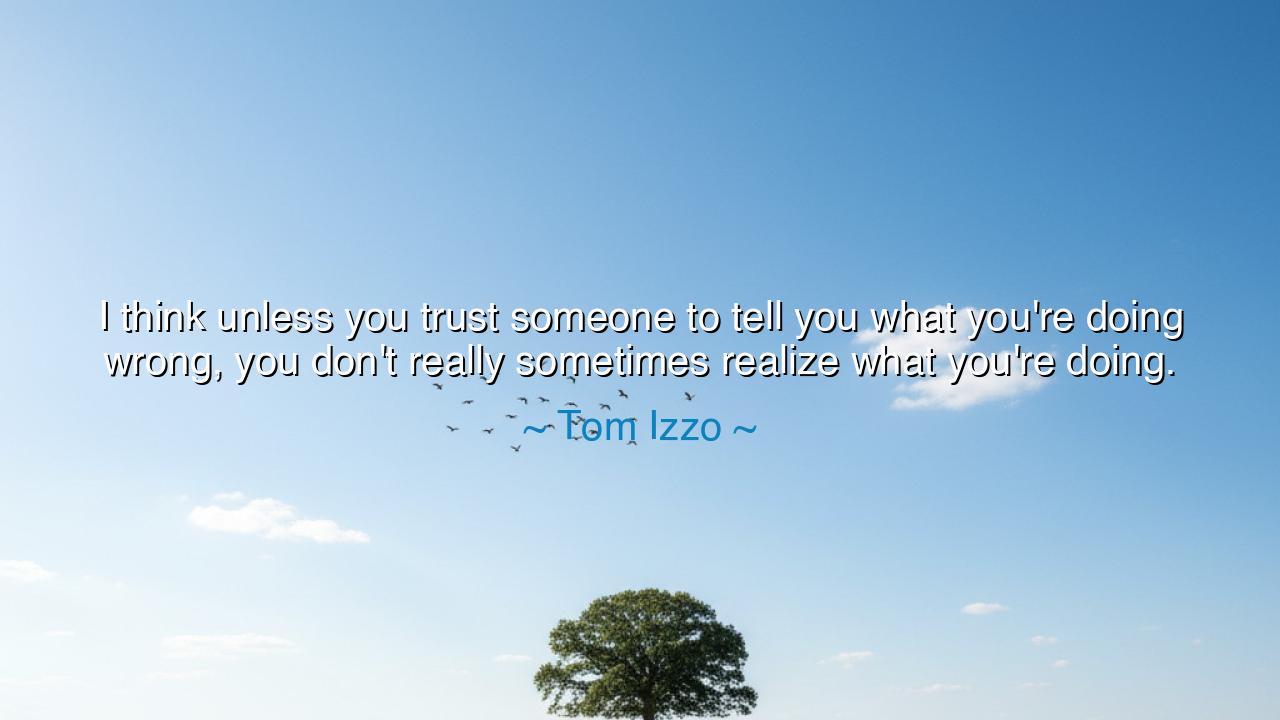
I think unless you trust someone to tell you what you're doing
I think unless you trust someone to tell you what you're doing wrong, you don't really sometimes realize what you're doing.






Hear the words of Tom Izzo, a teacher of athletes yet also a teacher of the soul: “I think unless you trust someone to tell you what you’re doing wrong, you don’t really sometimes realize what you’re doing.” These words strike like a bell upon the heart, for they reveal a truth as old as time itself—that man cannot see his own face without a mirror, nor can he discern all his own faults without the voice of another. Trust, then, becomes the bridge between ignorance and wisdom, between pride and growth.
Izzo, a coach of warriors on the basketball court, spoke from long labor in the crucible of discipline and training. He knew that even the strongest athlete cannot see every flaw in his own movement, nor every weakness in his own character. Without correction, small errors grow into habits, and habits into defeat. But when a leader is trusted to point out these weaknesses, the player grows into greatness. Thus Izzo’s words are not only about sport, but about life itself. For in every art, in every craft, in every walk of life, we need the courage to hear what we do not wish to hear.
History provides us with a shining example in the story of Alexander the Great and his teacher, Aristotle. Though Alexander would one day conquer empires, as a youth he was guided by the philosopher, who taught him not only the sciences but also the errors of arrogance and haste. Because Alexander trusted his mentor, he was able to shape himself into a leader whose influence outlived his years. Without such correction, his genius might have consumed itself in reckless ambition. This story reveals what Izzo teaches: that only those who open themselves to rebuke will find the path to mastery.
Yet such trust is not easily given. To allow another to correct us requires humility. The proud soul resists, believing itself complete. But the wise soul recognizes that every man walks with blind spots, and that a true friend or mentor is not one who flatters, but one who reveals what we cannot see. Izzo reminds us that without this trust, we wander in self-deception, never realizing how far we may have strayed. Correction, though painful, is the medicine that prevents deeper wounds.
There is also great courage required in giving such correction. For to speak truth to another about their faults is to risk rejection or anger. Thus, the relationship must be rooted in trust—a trust earned through loyalty, consistency, and genuine care. When the one who corrects is known to seek our good, their words, even if hard, can be received as a gift. In this way, correction becomes not condemnation, but a pathway to wisdom and growth.
The lesson, then, is twofold. First, seek out those whom you can trust to tell you when you are wrong. Invite them into your life, and do not close your ears when they speak. Second, strive to be such a voice for others—not as a critic who delights in pointing out weakness, but as a friend who desires another’s strength. In this balance, communities grow, teams flourish, and individuals rise beyond their limits.
Therefore, O children of wisdom, remember Izzo’s words: no one sees clearly alone. Just as iron sharpens iron, so one soul sharpens another. Do not hide from correction, for it is the forge of greatness. Build relationships where truth can be spoken without fear, and in doing so, you will discover not only what you are doing wrong, but also what you are capable of doing right. This is the path of humility, of growth, and of enduring strength.
–––






Kkafe
Izzo’s quote brings up an interesting point about self-awareness and growth. It’s tough to see our own mistakes sometimes, but can we really expect someone else to always point them out? Shouldn't we take more responsibility for recognizing our own shortcomings? What do you think—can we get better at identifying what we’re doing wrong, or is external feedback always necessary for personal development?
CLCAM LY
This quote resonates with me because I think trust is key when it comes to receiving constructive criticism. But what happens if the person giving you feedback isn’t always right or if their intentions aren’t genuine? How do you differentiate between helpful advice and feedback that’s more about criticism than improvement? How do we ensure the people we trust with this feedback have our best interests at heart?
TTPham Thi Trang
I totally agree with Tom Izzo. Sometimes we’re too close to a situation to see our own mistakes. But that brings up an interesting question: Is it always necessary to have someone tell you what you're doing wrong, or can self-awareness and reflection get you there too? How do we become better at recognizing our own flaws without constantly relying on others for validation?
TVLong Nhan Tran Van
Tom Izzo’s quote really speaks to the importance of constructive feedback. It’s true that sometimes we don’t realize our mistakes until someone else points them out. But how do we find the right people to trust with this kind of honesty? Can you really trust someone to give you feedback that’s not just critical but actually helpful? How do we balance taking advice without letting it undermine our confidence?